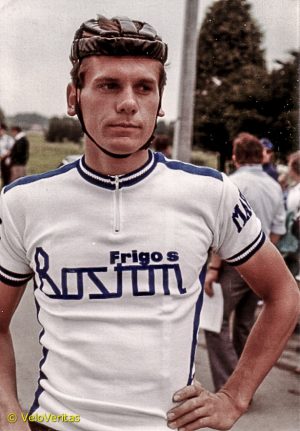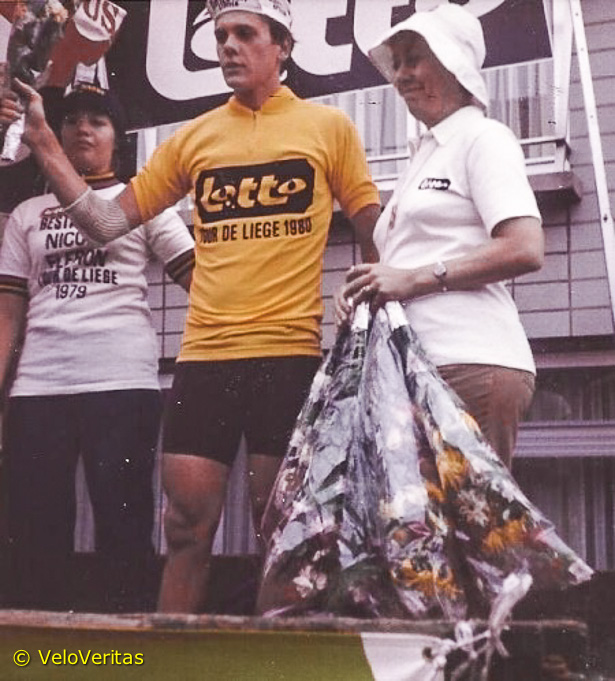
Here at VeloVeritas we’ve been doing a bit of research into Six Days from years gone by and a name that cropped up was that of Derek Hunt.
Hunt was a very successful schoolboy and junior on the UK scene in the 70’s before moving to The Netherlands where he was a regular participant in the amateur Six Days – notably, winning the Maastricht race.
His road performances, particularly a fine overall win in the 1980 Tour de la Province de Liege gained him a contract with the Boston professional team alongside Tour de France winner Lucien Van Impe for 1981.
Three second places in stages of the Ruta Del Sol, a solid ride in Milan-Sanremo, 25th in the Amstel Gold race and 14thLiege-Bastogne-Liege boded very well for the future.
But crashes and teams folding took their toll; so Hunt headed off to catch some waves ‘Down Under’ before his immense potential was ever realised.
We spoke to him recently about those heady days back in the 80’s …
You were British schoolboy TT and junior pursuit champion – you obviously had a natural talent for the bike?
“I always loved riding my bike and got into cycling at the age of 12. But I think the thing that helped me a lot was being with the Hemel Hempstead club.
“There was a lot of encouragement in all aspects of cycling and whilst at the time I didn’t know it, there was a lot of support for new riders from senior dedicated club members.”
Remind us your other palmarès as a youngster, please.
“Wow, that was a long time ago!”
You chose The Netherlands as the place to be – why there and not Belgium or France?
“At the time the Dutch cycling scene was very strong and they were dominating most of the Euro races. I had previously been to Holland for a week of racing and loved it – that gave me the idea to return.
“As I said before, the riders were very strong and I figured that if I was going to learn how to race properly I was going to learn from the best!”
What was the set up like in The Netherlands – accommodation, the team, making ends meet?
“I stayed with Les Woodland for a week on the Belgium border but he had small children and it was difficult. I found a Dutch family who had a young son who raced and I moved in with them.
“They were the other side of the border and so trips to race in Belgium were easy. They were great; they refused to speak English and so I managed after three months to be able to read, write and speak fluent Dutch.
“I rode for a Dutch club WV Roosendaal, and at the same time was working on building sites as a carpenter/labourer.
“I scored a ride with Batavus for a year and then rode for a local team closer to where I was based – Transvemij – Van Schilt.
“The owner/manager of this team was fantastic and I learned a lot from him.”
You won the Maastricht amateur Six Day and were second in Rotterdam – tell us about those rides, please.
“I rode quite a few amateur Sixes. Having ridden the track in the UK it was easy for me to go there in the winter months.
“It was a darn site easier than cyclocross and a lot warmer too! I rode Maastricht with a local rider (Eric Vissers was his name I think) he was a good road rider and very strong.
“Maastricht was a 160 metre portable track, owned by Ron Webb. It was used in London, Maastricht, Copenhagen and various other venues, but being only 160 metres it was tight and fast, needless to say it was not without incident that we won!
“Rotterdam would have to have been my favourite track. They had Sunday races there in the winter months that were just fantastic; lots of racing with a star-studded field. It was a real testing ground as to how your form was. I rode there every week so knew the track well.
“Unfortunately I cannot remember who I rode with in the Six there – it was either Peter Hellemons or Johan Kuiken. Anyway we pulled off second – there was no way we were going to win.
“The Rotterdam Six was always won by Dutch riders!”

Your big result as an amateur was the Tour of Liege in 1980; tell us about that.
“That was one hell of a race. It rained – no, poured – for the entire race, all nine stages.
“We were taken over roads that were closed due to flooding.
“They pushed the barriers aside and sent the race through – typical Belgium!
“I loved it!
“I remember we ran out of dry clothes as did every other team and so in the morning we put all our gear in a bath tub with hot water in it and then got dressed for the days racing! At least the clothing was warm – or that was the theory anyway!
“There were numerous incidents in that race, there was a crash and all the leaders’ jerseys were on the ground. Yellow (leader), Green (points) and Red (mountain)… complete panic!”
Did that get you the ride with Boston in ’81 – what was the set up like?
“Yeah Pretty much. That Liege Tour carried a lot of weight.
“Also I was in the leaders’ jersey from stage one and kept it for the entire race.
“Many Pro team managers watched the race and many riders got contracts from their results in that event.”
You had strong results in ’81 with Boston – top 15 in Liege for example and three second places in the Ruta – good rides for a young pro.
“Yes I settled in pretty well.
“Lucien Van Impe was our star rider and he gave out good advice that helped the younger riders. There was not much that he hadn’t done in his career by the time he rode for Boston and he was very easy to get along with.
“He was a great team leader.”
What came after Boston, in ’82?
“After the Boston team folded, we all lost our contracts. And because of my crash where I broke my back earlier in the season and missed out on a ride in the Tour De France I had poor results so getting another contract proved difficult.
“I ended up riding for B&S Elro snacks a small Dutch team on a very limited budget. We only rode the smaller classics and it was hard to get the recognition needed to get a decent ride in a bigger team.
“So that’s when I decided to move to Australia.”
You were team mates with Gary Wiggins for a while – what are your recollections of ‘The Doc’?
“He was great – one of the funniest people I have met.
“He never took it too seriously he just loved riding – a great friendly face in the peloton. He could ride hard when he wanted to and he really knew how to suffer on the bike.
“Although he rode the track he was a fantastic road rider too – he was one great all round rider.”
You rode with Suntour in ’82/83 -what was your programme like?
“I was riding for Suntour in ’82 when I first came to Australia but only as a single rider not in a team.
“I rode the Track carnivals in Tasmania at Christmas and a few local races but not really that much.”
Why quit?
“I had a run in with the officials running New South Wales cycling and never raced again.
“I was pretty much distracted with the surf scene out here and got into that. It was a lot less hassled.”
Why Australia?
“As I said before I was pretty busted up; I broke my back and then broke my knee in the same season.
“I met some Australian riders who asked me to come out to Oz for the Euro winter which made sense. The trouble is I never went back!”
How much did you race there?
“I rode a few races sponsored by Suntour but the racing scene was pretty primitive back then and the officials seemed to not be too keen to change their thinking so I gave it away.”
Six Days: how many did you ride, how did you get the contracts?
“I really cannot remember exactly how many, sorry; but I rode a lot as an amateur, Maastricht, Groningen, Rotterdam, Gent, Antwerp, Dortmund, Milan, Copenhagen and Zürich.
“And as a pro I rode London, Munich, Dortmund and one other I think – it’s a long time ago!”
The Skol London Six, tell us about that, please.
“That was a blast! I had only just turned pro.
“I was 21 and was the youngest rider in the race and rode with Wilfred Peffgen who was 40 then, I think and the oldest rider in the field?
“He was amazing; he was as cool as a cucumber! It was a real privilege to ride with him. He was always in the right spot, always on the best wheel, never missed a change; I couldn’t have asked for a better partner to ride my first Six with.”
You rode with Maurice in Munich – what was he like as a partner?
“Yeah he was OK.
“We were both a bit green at that stage and both learning so it was not as smooth as if you were riding with an experienced rider.”
Munich – that was one tough race…
“Yeah I remember I had the flu and was really dragging myself around the track.
“Six Days are hard especially if you’re not firing 100%!”
Does life in Oz still involve cycling?
“No not at all – surfing and riding off road moto-X bikes!”
With thanks to Derek: another for the ‘ones that got away‘ file.



